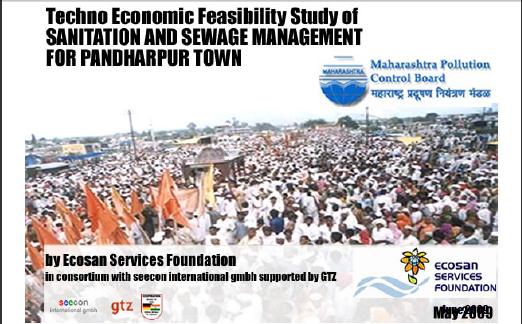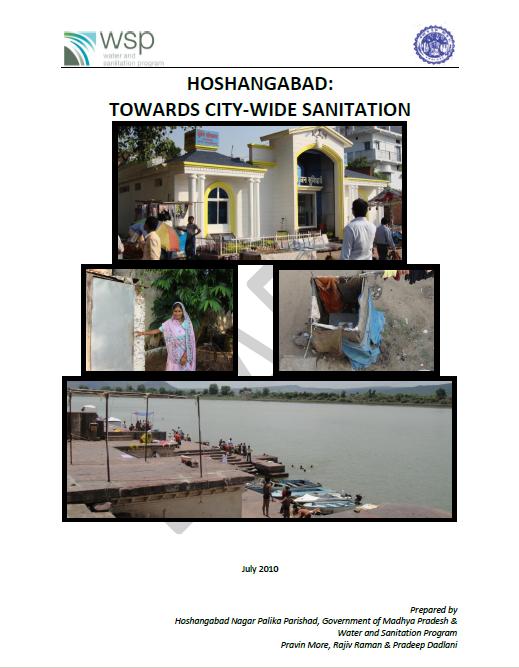Storage and Supply
Presentations from the Water India conference organised by Confederation of Indian Industry (2011)
Posted on 12 Apr, 2011 11:56 PMThe Confederation of Indian Industry (CII)organised the Water India conference, around the theme “Transforming the municipal and industrial water landscape - Issues, challenges and opportunities".
Groundwater use in Aurangabad – A survey and analysis of social significance and policy implications for a medium-sized Indian city by GW MATE and World Bank (2008)
Posted on 12 Apr, 2011 01:17 AMAurangabad, a city in central Maharashtra is in a drought prone region, and being a rapidly urbanising town, is facing a lot of pressure on ots water resources. Besides importing water there has been an increasing trend of ground water extraction.
In this context, a survey of groundwater use was conducted as part of a World Bank study on Indian groundwater management. The study was a collaboration between GW MATE(Groundwater Management Advisory Team) and GRASP (Grass Roots Action for Social Participation), an Aurangabad-based civil society organization working on community-based natural resource management.
New policy framework for rural drinking water supply: Swajaldhara guidelines – An article by Philippe Cullet in Economic and Political Weekly
Posted on 11 Apr, 2011 07:09 PMIt examines its evolution from the 1970s onwards and focuses, in particular, on the reforms of the past decade, looking more specifically at the Swajaldhara Guidelines. These reforms are of capital importance because they seek to completely change the rural drinking water supply policy framework.
Indian standard code of practice for installation of septic tanks (IS: 2470) - Bureau of Indian Standards (1986)
Posted on 11 Apr, 2011 03:46 AMThis IS Code provides various requirements that have to be met while constructing a septic tank, so that it meets minimum standards. This Code is dictated by the Bureau of Indian Standards, and ensures that the sewage is treated in a way that maintains health and hygiene of the community.
While the first standard for small septic tanks was first printed in 1963 and then revised in 1968, the standard for disposal of effluent from septic tanks was published later in 1964 and revised in 1971.
This code has been sourced through City Managers' Association Karnataka (CMAK), a non profit that provides technical expertise to urban local bodies.
Role of civil society in sanitation improvement - A case-study from the work of Parivartan in Uttar Pradesh (2010)
Posted on 11 Apr, 2011 12:33 AMThis presentation prepared by the founders of Parivartan, a Kanpur based NGO, deals with the organisation's efforts to improve the sanitation system of the town by involving local citizenry.
Captain SC Tripathi, the founder of Parivartan explains that his organisation is based on a 'collective' model where in all aspects from ideation to implementation is a collective effort. This model seemed appropriate considering the different problems that Kanpur was facing ranging from sanitation issues to drainage, power outages etc. Added to this was political and official apathy, indifference and cynicism of citizenry.
Techno-economic feasibility study of sanitation and sewage management for Pandharpur town, Maharashtra - Ecosan Services Foundation (2009)
Posted on 10 Apr, 2011 02:15 AM This study provides interventions to solving the sanitation crisis in the holy town of Pandharpur, situated on the banks of the Chandrabagha/Bhima river, in the state of Maharashtra, which receives more than 1.5 crore devotees annually. On any given day there are approximately 20,000 pilgrims in this Class B town. This vast floating population creates massive sanitation problems leading to environmental and hygiene issues. The study forms part of the Maharashtra State Pollution Control Board's 'Environmental Improvement Programme at Religious Places in Maharashtra' project.
This study provides interventions to solving the sanitation crisis in the holy town of Pandharpur, situated on the banks of the Chandrabagha/Bhima river, in the state of Maharashtra, which receives more than 1.5 crore devotees annually. On any given day there are approximately 20,000 pilgrims in this Class B town. This vast floating population creates massive sanitation problems leading to environmental and hygiene issues. The study forms part of the Maharashtra State Pollution Control Board's 'Environmental Improvement Programme at Religious Places in Maharashtra' project.
Hoshangabad - Towards city wide sanitation - A draft report by Hoshangabad Nagar Palika Parishad and WSP
Posted on 10 Apr, 2011 01:57 AM  This proposal prepared by Hoshangabad Nagar Palika Parishad, Government of Madhya Pradesh and Water and Sanitation Programme South Asia, is meant to ensure that every household in this town adopts safe sanitation practices and is to help enable the urban local body, implement a city wide sanitation programme that finally ensures collection and treatment of waste.
This proposal prepared by Hoshangabad Nagar Palika Parishad, Government of Madhya Pradesh and Water and Sanitation Programme South Asia, is meant to ensure that every household in this town adopts safe sanitation practices and is to help enable the urban local body, implement a city wide sanitation programme that finally ensures collection and treatment of waste.
This document is the tenth mile stone in the process of achieving the goal of city-wide sanitation for Hoshangabad.
Water management through communities in Uttarakhand - Neelima Garg
Posted on 28 Mar, 2011 06:36 PMThe conflict is over how water is perceived, valued and treated. Water is life savior elixir. The importance of water as a vital resource to the life system and an essential component of societal development cannot be over emphasized. Over the years, many ancient civilizations emphasized on various mechanisms of water collection & distribution.
Allocation, release and utilization of funds for safe drinking water in rural and tribal areas under NRDWP for the last three years - PIB release
Posted on 21 Mar, 2011 12:46 PMFunds are released to the States under National Rural Drinking Water Programme (NRDWP) by the Government of India for providing drinking water supply in rural areas covering the rural and tribal areas of the State.
About 30% of rural household’s access piped drinking water from taps. However, full coverage of rural habitations is about 75%.
Panel discussion on "The Race for Water: Securing Asia's Water Future", 10th March, 2011, Mumbai
Posted on 01 Mar, 2011 04:15 PM![]() The Race for Water: Securing Asia’s Water Future.
The Race for Water: Securing Asia’s Water Future.
Organizers:
- Asia Society
- Columbia Alumni Association
- Columbia Global Centers - South Asia
- Columbia Water Center





